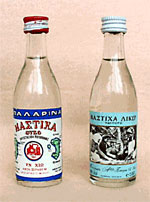 Chios Mastiha Ouzo (left) and Mastiha Liqueur (right) Chios Mastiha Ouzo (left) and Mastiha Liqueur (right) | |
| Type | liqueur |
|---|---|
| Country of origin | Greece |
| Region of origin | Chios |
| Alcohol by volume | >15% or 47% |
| Colour | transparent crystal clear to yellowish |
| Flavour | mastic |
| Ingredients | water, alcohol, sugar, mastic |
Mastika or mastiha is a liqueur seasoned with mastic, a resin with a slightly pine or cedar-like flavor gathered from the mastic tree, a small evergreen tree native to the Mediterranean region. In Greece, mastiha (Greek: μαστίχα) or mastichato (Greek: μαστιχάτο) is a sweet liqueur produced with the mastika resin from the Greek island of Chios, which is distilled after hardening to crystals. Sugar is typically added. It is a sweet liqueur that is typically consumed at the end of a meal. It has a distinctive flavor, reminiscent of pine and herbs. It is claimed to have medicinal properties and to aid digestion.
In August of 2012, wildfires spread across the island of Chios, scorching 31,480 acres (12,740 ha) and destroying more than half of the island's mastic orchards. Because the product has a "protected designation of origin" from the European Union, the fire not only impacted local Chios farmers, who lost approximately 60 percent of their crops, but also derailed the global supply of the product.
Chios Mastiha

Chios Mastiha Liqueur (Greek: Μαστίχα Χίου, Greek pronunciation: [masˈtixa ˈçi.u]) is a liqueur flavoured with mastic distillate or mastic oil from the island of Chios. The name Chios Mastiha has protected designation of origin status in the European Union. Chios Mastiha liqueur is clear with a sweet aroma. It is traditionally served cold.
Production
The process is regulated by Greek law and includes the flavouring of alcohol with mastic oil by agitation or the distillation of mastic with alcohol. The solution is then diluted with water and sweetened with sugar. The final alcoholic strength by volume of Chios Mastiha must be at least 15%.
Flavouring
Main article: Mastic (plant resin)The only flavouring agents used in Chios Mastiha liqueur are an alcoholic distillate of mastic or mastic oil made from Chios mastic. Mastic is the hardened sap harvested from the mastic tree, Pistacia lentiscus var chia, a small evergreen shrub that grows on rocky terrain on the southern part of the island. Chios mastic is certified by the Agricultural Products Certification and Supervision Organization as part of the Hellenic Ministry of Rural Development and Food. The island's mastic production is controlled by a co-operative of medieval villages, the Mastichochoria.
Producers and distributors
Chios
- The Growers' Spirit is a producing company run by the Chios Gum Mastic Growers Association (CGMGA). The CGMGA offers Mastiha liqueur made with both mastic distillate and mastic oil in two different variants: Kentos (20% alcohol) and Enosis (30% alcohol).
- Stoupakis Chios Distillery produces Homeric Mastiha, which contains mastic distillate.
- Tetteris Distillery is one of the oldest producers of mastiha liqueur. Tetteris traditional distillery was founded in 1912. Before the company foundation, Stylianos Tetteris was producing and selling ouzo infused with mastic, for exportation. In 1954, Eleftherios Tetteris, seeing the tendency of the consumer public towards local liqueurs, and having studied oenology in France, was the first to experiment in the production of Mastic liqueur by distilling grains in a special way, and developed a special method (that only the Tetteri distillery knows and uses until today), taking natural distillate, and then with the addition of alcohol and sugar, produced the Mastic liqueur.
KLEOS Mastiha Spirit is the first luxury mastiha brand from Greece launched in March 2018, by the first Greek woman in history to start a liquor brand, Effie Panagopoulos. It is the only double distilled, small batch, low in sugar mastiha on the market.
Wider Greece
- Skinos, based in Athens.
- Finest Roots,<refFinest Roots</ref> based in Kalamata, produces Roots Mastic] and Roots Mastic Vintage Strength.
- Mavrakis, based in Patra.
- D'ARGO Distillery, based in Athens, produces CHANDOLIA Mastic Liqueur by 100% Distillate
United States
- Mastrogiannis Mastiha
- Ambrosia Group , based in Miami, produces FOS Greek Mastiha.
- YA Mastiha
History
Mastic has been harvested for at least 2,500 years since Greek antiquity. The first mention of actual mastic 'tears' was by Hippocrates. Hippocrates used mastic for the prevention of digestive problems, colds and as a breath freshener. Roman emperors used mastic along with honey, pepper, and egg in the spiced wine conditum paradoxum. Digestive liqueurs, similar to Mastiha but made with grapes, were known as the Greek elixirs before the French Revolution.
Influence in literature
Greek writer and journalist Zoe Rapti released a novel titled Έρωτας με Λικέρ Μαστίχα (Love with Mastic Liqueur) in 2013. The book is in development to become a film.
See also
References
- "What You Need to Know About Greek Mastika". www.greekboston.com. 2015-04-30. Retrieved 2022-03-29.
- Kallivoka, Denny. "Greek Spirits Guide: Everything you need to know about mastiha liqueur". www.discovergreece.com. Retrieved 2022-03-29.
- Difford, Simon. "Mastiha (AKA:Mastika, Masticha, Mastic, Mαστίχα". www.diffordsguide.com. Retrieved 29 December 2019.
- "Wildfire on Chios". earthobservatory.nasa.gov. 2012-08-22. Retrieved 2022-03-04.
- "Masticha Chiou". Database of Origin and Registration. European Commission Agriculture and Rural Development. Retrieved 29 August 2017.
- "Inspection and Certification of PDO and PGI Products". Agrocert. Hellenic Agricultural Organization. Retrieved 29 August 2017.
- "The Growers' Spirit in the UK". Mastiha World. Archived from the original on 2017-07-08. Retrieved 2021-07-26.
- Eleftherios Tetteris
- [https://finestroots.com/mastic Roots Mastic
- Roots Mastic Vintage Strength
- Mastrogiannis Mastiha; Archived 2021-07-26 at the Wayback Machine
- Doss, Laine. "Fos Greek Mastiha: Go Greek at the Setai". Miami New Times. Retrieved 29 August 2017.
- "Love with Mastic Liqueur" (Mystery, Romance). Retrieved 2024-06-06.